奥巴马2015国情咨文
- 格式:doc
- 大小:96.00 KB
- 文档页数:31
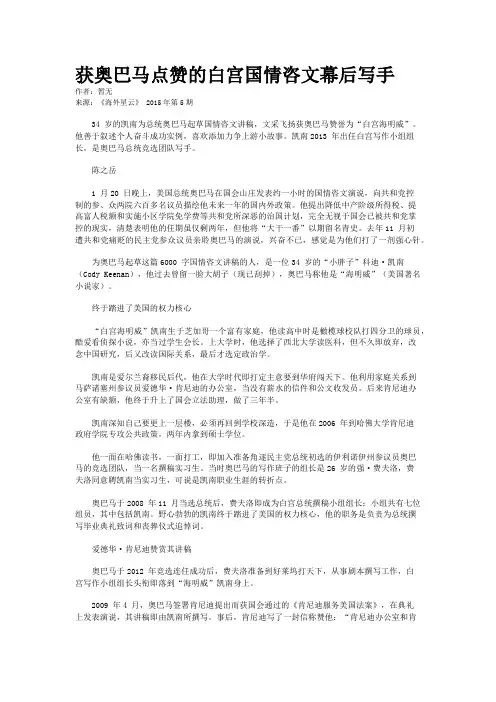
获奥巴马点赞的白宫国情咨文幕后写手作者:暂无来源:《海外星云》 2015年第5期34 岁的凯南为总统奥巴马起草国情咨文讲稿,文采飞扬获奥巴马赞誉为“白宫海明威”。
他善于叙述个人奋斗成功实例,喜欢添加力争上游小故事。
凯南2013 年出任白宫写作小组组长,是奥巴马总统竞选团队写手。
陈之岳1 月20 日晚上,美国总统奥巴马在国会山庄发表约一小时的国情咨文演说,向共和党控制的参、众两院六百多名议员描绘他未来一年的国内外政策。
他提出降低中产阶级所得税、提高富人税额和实施小区学院免学费等共和党所深恶的治国计划,完全无视于国会已被共和党掌控的现实,清楚表明他的任期虽仅剩两年,但他将“大干一番”以期留名青史。
去年11 月初遭共和党痛贬的民主党参众议员亲聆奥巴马的演说,兴奋不已,感觉是为他们打了一剂强心针。
为奥巴马起草这篇6000 字国情咨文讲稿的人,是一位34 岁的“小胖子”科迪·凯南(Cody Keenan),他过去曾留一脸大胡子(现已刮掉),奥巴马称他是“海明威”(美国著名小说家)。
终于踏进了美国的权力核心“白宫海明威”凯南生于芝加哥一个富有家庭,他读高中时是橄榄球校队打四分卫的球员,酷爱看侦探小说,亦当过学生会长。
上大学时,他选择了西北大学读医科,但不久即放弃,改念中国研究,后又改读国际关系,最后才选定政治学。
凯南是爱尔兰裔移民后代,他在大学时代即打定主意要到华府闯天下。
他利用家庭关系到马萨诸塞州参议员爱德华·肯尼迪的办公室,当没有薪水的信件和公文收发员。
后来肯尼迪办公室有缺额,他终于升上了国会立法助理,做了三年半。
凯南深知自己要更上一层楼,必须再回到学校深造,于是他在2006 年到哈佛大学肯尼迪政府学院专攻公共政策,两年内拿到硕士学位。
他一面在哈佛读书,一面打工,即加入准备角逐民主党总统初选的伊利诺伊州参议员奥巴马的竞选团队,当一名撰稿实习生。
当时奥巴马的写作班子的组长是26 岁的强·费夫洛,费夫洛同意聘凯南当实习生,可说是凯南职业生涯的转折点。

美国总统奥巴马年度国情咨文(七)We can also spur energy innovation with new incentives. The differences in this chamber may be too deep right now to pass a comprehensive plan to fight climate change. But there’s no reason why Congress shouldn’t at least set a clean energy standard that creates a market for innovation. So far, you haven’t acted. Well, tonight, I will. I’m directing my administration to allow the development of clean energy on enough public land to power 3 million homes. And I’m proud to announce that the D epartment of Defense, working with us, the world’s largest consumer of energy, will make one of the largest commitments to clean energy in history -– with the Navy purchasing enough capacity to power a quarter of a million homes a year. (Applause.)我们也能够通过新的鼓励项目来刺激能源创新。
目前国会的分歧或许太深,难以为解决气候变化问题通过一项全面的方案。
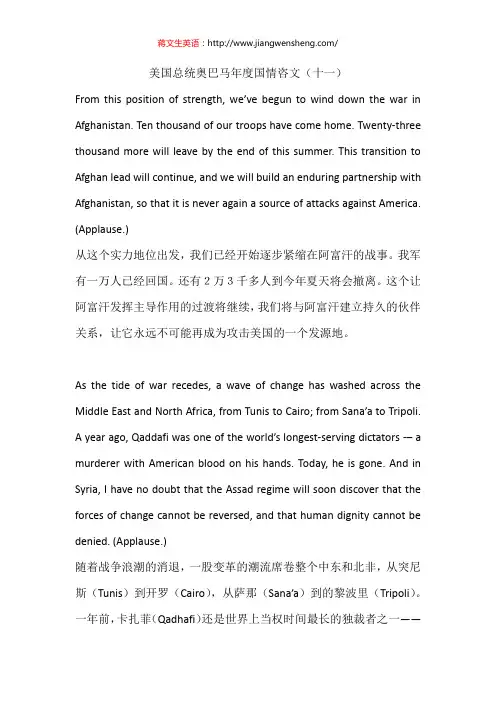
美国总统奥巴马年度国情咨文(十一)From this position of strength, we’ve begun to wind down the war in Afghanistan. Ten thousand of our troops have come home. Twenty-three thousand more will leave by the end of this summer. This transition to Afghan lead will continue, and we will build an enduring partnership with Afghanistan, so that it is never again a source of attacks against America. (Applause.)从这个实力地位出发,我们已经开始逐步紧缩在阿富汗的战事。
我军有一万人已经回国。
还有2万3千多人到今年夏天将会撤离。
这个让阿富汗发挥主导作用的过渡将继续,我们将与阿富汗建立持久的伙伴关系,让它永远不可能再成为攻击美国的一个发源地。
As the tide of war recedes, a wave of change has washed across the Middle East and North Africa, from Tunis to Cairo; from Sana’a to Tripoli.A year ago, Qaddafi was one of the world’s longest-serving dictators -– a murderer with American blood on his hands. Today, he is gone. And in Syria, I have no doubt that the Assad regime will soon discover that the forces of change cannot be reversed, and that human dignity cannot be denied. (Applause.)随着战争浪潮的消退,一股变革的潮流席卷整个中东和北非,从突尼斯(Tunis)到开罗(Cairo),从萨那(Sana’a)到的黎波里(Tripoli)。
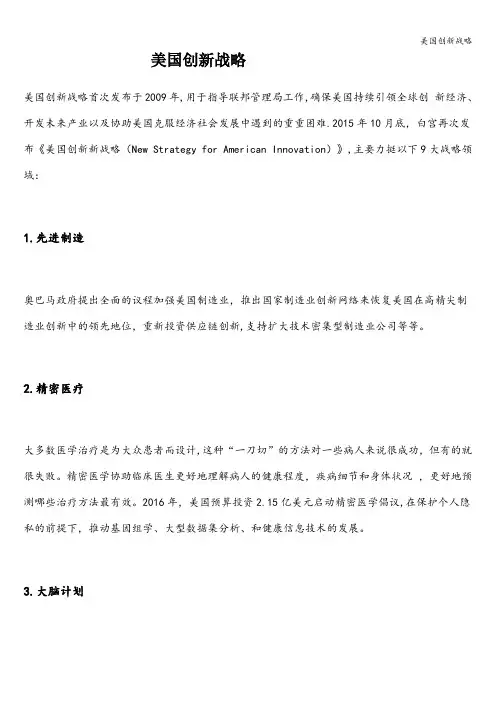
美国创新战略美国创新战略首次发布于2009年,用于指导联邦管理局工作,确保美国持续引领全球创新经济、开发未来产业以及协助美国克服经济社会发展中遇到的重重困难.2015年10月底,白宫再次发布《美国创新新战略(New Strategy for American Innovation)》,主要力挺以下9大战略领域:1.先进制造奥巴马政府提出全面的议程加强美国制造业,推出国家制造业创新网络来恢复美国在高精尖制造业创新中的领先地位,重新投资供应链创新,支持扩大技术密集型制造业公司等等。
2.精密医疗大多数医学治疗是为大众患者而设计,这种“一刀切”的方法对一些病人来说很成功,但有的就很失败。
精密医学协助临床医生更好地理解病人的健康程度,疾病细节和身体状况,更好地预测哪些治疗方法最有效。
2016年,美国预算投资2.15亿美元启动精密医学倡议,在保护个人隐私的前提下,推动基因组学、大型数据集分析、和健康信息技术的发展。
3.大脑计划社会和经济负担造成的神经疾病时有发生,开发新的治疗方法是解决这些问题的关键。
通过基因对大脑进行全方位的认知,协助科学家和医生更好的诊断和治疗疾病神经类疾病,奥巴马政府预算3亿美元支持大脑计划。
4。
先进汽车突破在传感器、计算机和数据科学方面的发展,把车对车通讯和尖端自主技术投入商用。
加速先进汽车技术开发和部署应用,据统计,超过90%的事故涉及人为错误,而机器智能决策反应速度和精度度可以提升交通的安全性,每年可以挽救成千上万的生命。
奥巴马总统2016年财政预算加倍投资汽车技术研究、提升全自动汽车的性能和安全标准。
5.智慧城市越来越多的社区管理者、数据科学家、技术人员、和企业联合建立“智慧城市"。
奥巴马政府2016年财政预算3000多万美元用于投资智慧城市新研究和部署智慧城市设施。
6.清洁能源和节能技术在过去六年的时间里,美国来自风能和太阳能的电力生产增加了20多倍,联邦政府决定通过部署和开发清洁能源技术、鼓励投资倾向气候变化解决方案,进一步提高能源利用率,在保证提升美国能源安全的前提下,继续保持新能源生产量增加这一势头.7.教育技术目前,美国教育领域科技的使用与其他领域技术的使用程度之间差异显著.在过去五年,美国国防部高级研究计划局统计,经受过数字化训练的海军学生比98%的通过传统训练的海军学生表现要更为优秀。
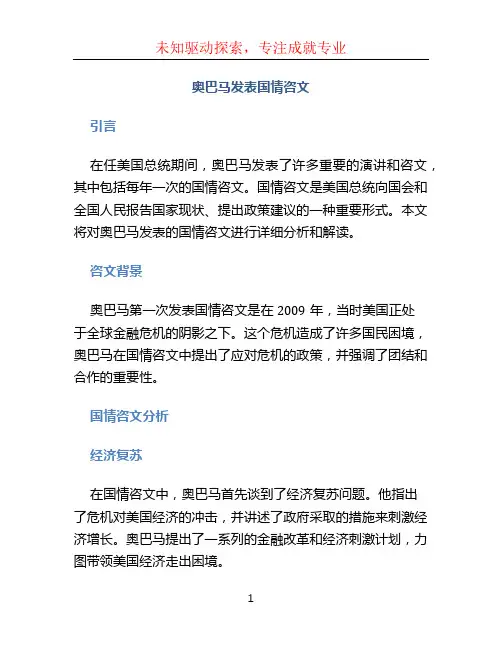
奥巴马发表国情咨文引言在任美国总统期间,奥巴马发表了许多重要的演讲和咨文,其中包括每年一次的国情咨文。
国情咨文是美国总统向国会和全国人民报告国家现状、提出政策建议的一种重要形式。
本文将对奥巴马发表的国情咨文进行详细分析和解读。
咨文背景奥巴马第一次发表国情咨文是在2009年,当时美国正处于全球金融危机的阴影之下。
这个危机造成了许多国民困境,奥巴马在国情咨文中提出了应对危机的政策,并强调了团结和合作的重要性。
国情咨文分析经济复苏在国情咨文中,奥巴马首先谈到了经济复苏问题。
他指出了危机对美国经济的冲击,并讲述了政府采取的措施来刺激经济增长。
奥巴马提出了一系列的金融改革和经济刺激计划,力图带领美国经济走出困境。
医疗改革奥巴马在国情咨文中也强调了医疗改革的重要性。
他指出美国的医疗保健体系存在许多问题,导致了许多人无法获得负担得起的医疗服务。
奥巴马提出了一套一揽子医疗改革方案,并呼吁国会支持这些改革。
科技创新奥巴马认为科技创新是推动经济增长和社会发展的重要力量。
在国情咨文中,他提出了加大对科技研发的投入,并推动科技创新在各个领域的应用。
奥巴马希望通过科技创新来提高美国的竞争力并创造更多的就业机会。
气候变化奥巴马对气候变化问题非常关注,在国情咨文中他强调了应对气候变化的重要性。
奥巴马提出了一系列的环保政策和减排措施,力图减少碳排放并推动可持续发展。
教育改革奥巴马还在国情咨文中提到了教育改革。
他认为提高教育质量是提升国家竞争力和培养未来人才的关键。
奥巴马提出了一系列的教育改革措施,包括提高教师工资、改善学校设施等。
结论通过分析奥巴马发表的国情咨文,我们可以看到他在总统任期内关注了许多重要问题,并提出了一系列的政策建议。
从经济复苏到医疗改革,从科技创新到气候变化,奥巴马试图推动美国朝着更加繁荣、公正和可持续的方向发展。
国情咨文是奥巴马时期重要的政策传达和沟通方式,也是他治国理政思想和政策的重要体现。
奥巴马的国情咨文对美国产生了深远的影响,不仅在立法过程中起到了重要作用,也影响了全国人民对美国未来发展方向的认识。
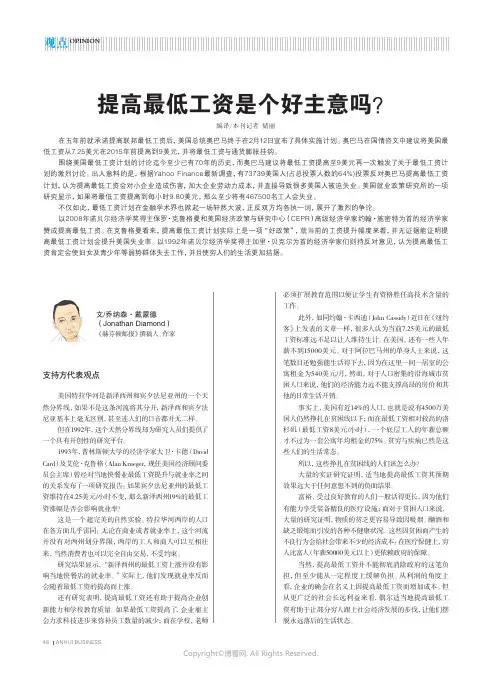
ANHUI BUSINESS48在五年前就承诺提高联邦最低工资后,美国总统奥巴马终于在2月12日宣布了具体实施计划。
奥巴马在国情咨文中建议将美国最低工资从7.25美元在2015年前提高到9美元,并将最低工资与通货膨胀挂钩。
围绕美国最低工资计划的讨论迄今至少已有70年的历史,而奥巴马建议将最低工资提高至9美元再一次触发了关于最低工资计划的激烈讨论。
出人意料的是,根据Yahoo Finance最新调查,有73739美国人(占总投票人数的64%)投票反对奥巴马提高最低工资计划,认为提高最低工资会对小企业造成伤害,加大企业劳动力成本,并直接导致很多美国人被迫失业。
美国就业政策研究所的一项研究显示,如果将最低工资提高到每小时9.80美元,那么至少将有467500名工人会失业。
不仅如此,最低工资计划在金融学术界也掀起一场轩然大波,正反双方均各执一词,展开了激烈的争论。
以2008年诺贝尔经济学奖得主保罗·克鲁格曼和美国经济政策与研究中心(CEPR)高级经济学家约翰·施密特为首的经济学家赞成提高最低工资。
在克鲁格曼看来,提高最低工资计划实际上是一项“好政策”,就当前的工资提升幅度来看,并无证据能证明提高最低工资计划会提升美国失业率。
以1992年诺贝尔经济学奖得主加里·贝克尔为首的经济学家们则持反对意见,认为提高最低工资肯定会使妇女及青少年等弱势群体失去工作,并且使穷人们的生活更加拮据。
OPINION观点 提高最低工资是个好主意吗?支持方代表观点美国特拉华河是新泽西州和宾夕法尼亚州的一个天然分界线,如果不是这条河流将其分开,新泽西和宾夕法尼亚基本上毫无区别,甚至连人们的口音都并无二样。
但在1992年,这个天然分界线却为研究人员们提供了一个具有开创性的研究平台。
1993年,普林斯顿大学的经济学家大卫·卡德(David Card )及艾伦·克鲁格(Alan Krueger,现任美国经济顾问委员会主席)曾经对当地快餐业最低工资提升与就业率之间的关系发布了一项研究报告:如果宾夕法尼亚州的最低工资维持在4.25美元/小时不变,那么新泽西州19%的最低工资涨幅是否会影响就业率?这是一个超完美的自然实验。
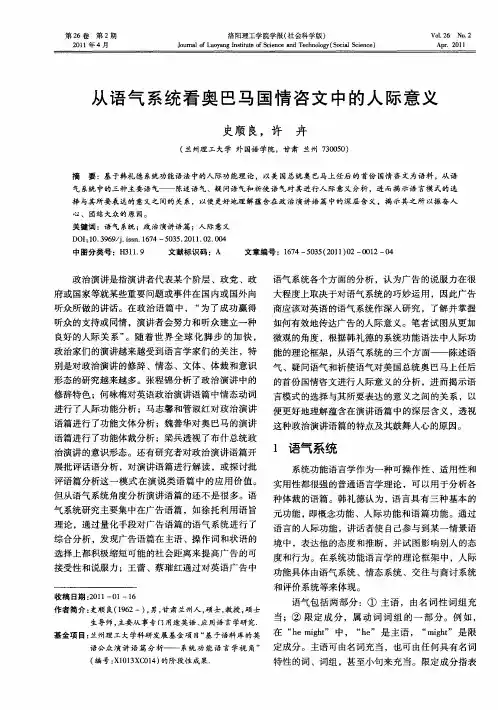
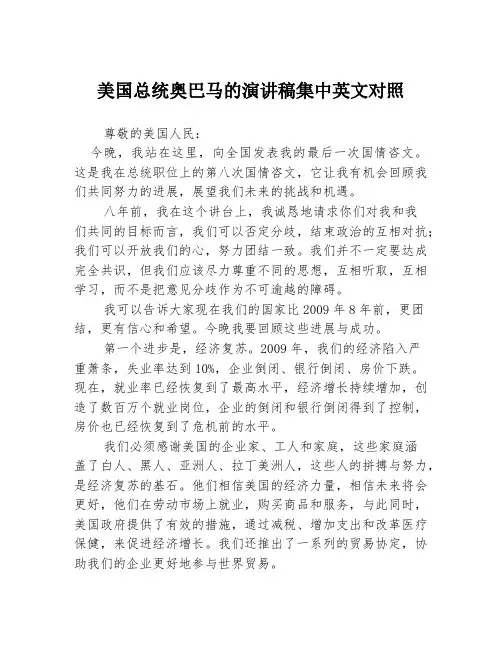
美国总统奥巴马的演讲稿集中英文对照尊敬的美国人民:今晚,我站在这里,向全国发表我的最后一次国情咨文。
这是我在总统职位上的第八次国情咨文,它让我有机会回顾我们共同努力的进展,展望我们未来的挑战和机遇。
八年前,我在这个讲台上,我诚恳地请求你们对我和我们共同的目标而言,我们可以否定分歧,结束政治的互相对抗;我们可以开放我们的心,努力团结一致。
我们并不一定要达成完全共识,但我们应该尽力尊重不同的思想,互相听取,互相学习,而不是把意见分歧作为不可逾越的障碍。
我可以告诉大家现在我们的国家比2009年8年前,更团结,更有信心和希望。
今晚我要回顾这些进展与成功。
第一个进步是,经济复苏。
2009年,我们的经济陷入严重萧条,失业率达到10%,企业倒闭、银行倒闭、房价下跌。
现在,就业率已经恢复到了最高水平,经济增长持续增加,创造了数百万个就业岗位,企业的倒闭和银行倒闭得到了控制,房价也已经恢复到了危机前的水平。
我们必须感谢美国的企业家、工人和家庭,这些家庭涵盖了白人、黑人、亚洲人、拉丁美洲人,这些人的拼搏与努力,是经济复苏的基石。
他们相信美国的经济力量,相信未来将会更好,他们在劳动市场上就业,购买商品和服务,与此同时,美国政府提供了有效的措施,通过减税、增加支出和改革医疗保健,来促进经济增长。
我们还推出了一系列的贸易协定,协助我们的企业更好地参与世界贸易。
第二个进展是,世界在共同抗击恐怖主义方面取得了进展。
去年11月,我们与我们的盟友击败了伊斯兰国在伊拉克和叙利亚的主要堡垒,摧毁了他们最后的抵抗力量并夺回了他们的领土。
在这场战役中,我们看到了我们战士的勇气和决心,他们是我们国家为之骄傲的英雄。
我们还召集了一系列国际会议,来协调我们的全球反恐战略。
我们与全球领袖团结一致,共同打击恐怖主义,并为数百万遭受战争和恐怖分子攻击的人民提供援助。
第三个进步是,我们的社会越来越加包容和多元。
我们通过平等法案支持同性婚姻,赋予LGBTQ社区平等的权利,在这个问题上,我们的社会发生了巨大的转变。
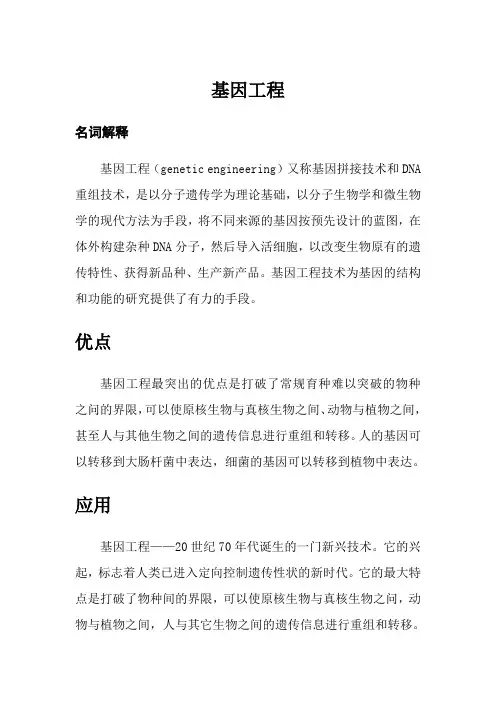
基因工程名词解释基因工程(genetic engineering)又称基因拼接技术和DNA 重组技术,是以分子遗传学为理论基础,以分子生物学和微生物学的现代方法为手段,将不同来源的基因按预先设计的蓝图,在体外构建杂种DNA分子,然后导入活细胞,以改变生物原有的遗传特性、获得新品种、生产新产品。
基因工程技术为基因的结构和功能的研究提供了有力的手段。
优点基因工程最突出的优点是打破了常规育种难以突破的物种之问的界限,可以使原核生物与真核生物之间、动物与植物之间,甚至人与其他生物之间的遗传信息进行重组和转移。
人的基因可以转移到大肠杆菌中表达,细菌的基因可以转移到植物中表达。
应用基因工程——20世纪70年代诞生的一门新兴技术。
它的兴起,标志着人类已进入定向控制遗传性状的新时代。
它的最大特点是打破了物种间的界限,可以使原核生物与真核生物之问,动物与植物之间,人与其它生物之间的遗传信息进行重组和转移。
自它问世以来,已显示出巨大的活力,解决了农业、工业,医药,环保等领域面临的诸多重大问题。
展望21世纪,基因工程的前景将更加灿烂辉煌,它的研究将全方面的、卓有成效把人类生活品质提高到一个崭新的水平。
市场中国基因工程市场的主要增长动力包括以下各项:1、DNA测序技术的应用越来越多DNA测序供货商通过使用成千上万个不同生物体的样本(可代表各种研究领域及行业)提供越来越多的应用。
随着新应用的开发,DNA测序的客户基础及市场需求持续快速增长。
2、基因组单价更加实惠随着新技术(如纳米孔,电子或微流体)的引进,每个DNA序列或基因组的兆碱基的价格更加优惠。
DNA测序技术一直用于多项应用之中,从而产生更多的高通量测序数据。
自该数据累积的知识及技术进一步改善基因组信息的临床应用。
3、DNA测序项目规模不断扩大随着DNA测序技术的成熟及成本不断降低,越来越多的客户在研究中使用高通量测序数据。
彼等会进一步恊动大规模项目,为DNA测序供货商带来更多收益。

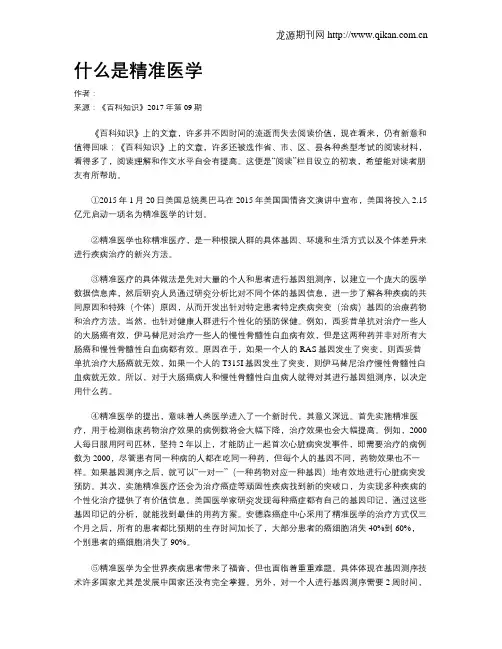
什么是精准医学作者:来源:《百科知识》2017年第09期《百科知识》上的文章,许多并不因时间的流逝而失去阅读价值,现在看来,仍有新意和值得回味;《百科知识》上的文章,许多还被选作省、市、区、县各种类型考试的阅读材料,看得多了,阅读理解和作文水平自会有提高。
这便是“阅读”栏目设立的初衷,希望能对读者朋友有所帮助。
①2015年1月20日美国总统奥巴马在2015年美国国情咨文演讲中宣布,美国将投入2.15亿元启动一项名为精准医学的计划。
②精准医学也称精准医疗,是一种根据人群的具体基因、环境和生活方式以及个体差异来进行疾病治疗的新兴方法。
③精准医疗的具体做法是先对大量的个人和患者进行基因组测序,以建立一个庞大的医学数据信息库,然后研究人员通过研究分析比对不同个体的基因信息,进一步了解各种疾病的共同原因和特殊(个体)原因,从而开发出针对特定患者特定疾病突变(治病)基因的治療药物和治疗方法。
当然,也针对健康人群进行个性化的预防保健。
例如,西妥昔单抗对治疗一些人的大肠癌有效,伊马替尼对治疗一些人的慢性骨髓性白血病有效,但是这两种药并非对所有大肠癌和慢性骨髓性白血病都有效。
原因在于,如果一个人的RAS基因发生了突变,则西妥昔单抗治疗大肠癌就无效,如果一个人的T315I基因发生了突变,则伊马替尼治疗慢性骨髓性白血病就无效。
所以,对于大肠癌病人和慢性骨髓性白血病人就得对其进行基因组测序,以决定用什么药。
④精准医学的提出,意味着人类医学进入了一个新时代,其意义深远。
首先实施精准医疗,用于检测临床药物治疗效果的病例数将会大幅下降,治疗效果也会大幅提高。
例如,2000人每日服用阿司匹林,坚持2年以上,才能防止一起首次心脏病突发事件,即需要治疗的病例数为2000,尽管患有同一种病的人都在吃同一种药,但每个人的基因不同,药物效果也不一样。
如果基因测序之后,就可以“一对一”(一种药物对应一种基因)地有效地进行心脏病突发预防。
其次,实施精准医疗还会为治疗癌症等顽固性疾病找到新的突破口,为实现多种疾病的个性化治疗提供了有价值信息。
精准医学(Precision Medicine)是一个生物医学医疗保健战略,对患者进行个性化诊断,医疗决策,药物,治疗及预后,从而改善生活质量。
美国总统巴拉克?奥巴马(Barack Obama)在1月20日的国情咨文中,2015年宣布启动一个新的精准医学倡议,“我发起一项新的精准医学计划使我们更接近治愈癌症和糖尿病等疾病,给我们所有人获得个性化的信息,使我们自己和我们的家人更加健康。
”精准医学,又称为“个性化医疗”,是一种医疗模式。
在这个模式中,是以个人基因组信息为基础,结合蛋白质组、代谢组等相关内环境信息,为患者量身设计出最佳治疗方案,以期达到治疗效果最大化和副作用最小化的一种定制医疗模式。
该模式从对“症”下药改变为对“人”下药,贯穿于疾病预防、分析、诊断、治疗的各个阶段。
最早的个性化医疗理念的提出和实施,归功于医学领域的基因组学的突破。
1999年12月初,英国的《Nature》杂志刊登了Dunham等216位科学家联合署名的人22号染色体DNA序列的学术论文。
它是人类基因组计划实施以来,在DNA大规模测序上的一项突破性进展,是最终完成人类全基因组序列测定的一个重要里程碑。
由此,关于结合个体的基因信息进行诊断和治疗的成功案例逐渐增多。
1997年,《Nature Biotechnology》载文称,基因组学的进展为“新一代个性化医疗”打下基础。
自此,“个性化医疗”成为人类畅想医疗模式从“对症下药”进入根据个体差异“量身定做”预测、诊断和治疗的方式。
这个转变主要得力于基因组学、信息技术发展以及对用户进行的医疗服务和产品营销。
2001年召开的上海国际生物技术和医药研讨会上,中国军事医学科学院王升启教授描述了医学发展的美妙前景:每个患者都有一张“基因卡”,医生刷卡识别信息,对人对症。
基因卡的核心技术就是生物基因芯片美国医学界在2011年首次提出了“精准医学”的概念。
美国财政预算计划在2016年拨付给美国国立卫生研究院(NIH)、美国食品药品监督管理局(FDA)、美国国家医疗信息技术协调办公室(ONC)等机构共2.15亿美元用于资助这方面的科学研究与创新发展。
新医学是解决人类健康问题的真正钥匙——需“精准”理解奥巴马的“精准医学计划”贺林【期刊名称】《遗传》【年(卷),期】2015(037)006【总页数】2页(P613-614)【作者】贺林【作者单位】中国科学院【正文语种】中文2015年年初,美国总统奥巴马在国情咨文中提出了一个预算2.15亿美元的“精准医学计划”,希望以此“引领一个医学时代”。
新闻一经发布,“精准医学”立刻成为了媒体和百姓嘴边的热词,受此影响国内亦有不少人士纷纷为美国总统的这一计划点“赞”。
有人用“医学革命”来形容它,有人用“开创性”来抬高它,还有一个传闻,受奥巴马“精准医学计划”的影响,中国将在15年内投入600亿元人民币启动并发展中国版的“精准医学计划”。
对此,有人提出了质疑,美国版精准医学计划是否符合中国国情?是否存在“水土不服”的可能?直接套用美国总统的智慧能否解决具有中国特色的实际问题?争论由此引发一个让人思考的问题,究竟什么才是现代医学的核心?在盲目堆钱的行动前,我们确实有必要从科学和临床应用的角度来探讨和思考一下现代医学的发展方向。
为了能“精准”地看到问题的实质,我将从当下时髦并且相关的词汇谈起,通过梳理,期待找出解决人类健康问题的真正钥匙。
奥巴马提出的“精准医学计划”主要涉及以下内容:1)启动“百万人基因组计划”(资助NIH 1.38亿美元)。
做好队列(Cohort)及对照,建立与临床有关的“史无前例的大数据”。
2)寻找引发癌症的遗传因素(资助NCI 78万美元),继续美国已经开始的癌症基因组研究计划。
3)建立评估基因检测的新方法(资助FDA 1000万美元),保护知识产权与有关版权的管理和保证精准医学和相关创新的需求。
4)制定一系列的相关标准和政策(资助ONC 500万美元),保护个人隐私和各种数据。
5)PPP(Public-Private-Partnership,公私合作)模式:企业家和非盈利组织参加。
从其主导的方向看,可以简单概括为以下3个方向:1)以科学研究为导向的百万美国人测序与癌症基因组计划;2)以政府功能为导向的法规标准的建立;3)以市场为导向的公私合作模式。
奥巴马就美国国情咨文演讲稿华盛顿当地时间1月20日晚9时(北京时间21日上午10时),美国总统奥巴马身着标志性黑色西装,准时现身国会开始进行20xx年国情咨文演讲,这也是他任内第六份国情咨文。
下面是由整理的20xx奥巴马国情咨文演讲稿,提供中英文对照,欢迎阅读。
Mr. Speaker, Mr. Vice President, Members of Congress, my fellow Americans:议长先生,副总统先生,国会议员们,美国同胞们:We are 15 years into this new century. Fifteen years that dawned with terror touching our shores; that unfolded with a new generation fighting two long and costly wars; that saw a vicious recession spread across our nation and the world. It has been, and still is, a hard time for many。
我们跨入新世纪已经20xx年了。
新世纪一开始,我们就遭受了恐怖袭击,新一代人就投入了两场旷日持久而又代价昂贵的战争,后来又发生了席卷全国乃至全球的恶性衰退。
对很多人来说,那时候是,现在也仍然是一段艰难的时期。
But tonight, we turn the page. Tonight, after a breakthrough year for America, our economy is growing and creating jobs at the fastest pace since 1999. Our unemployment rate is now lower than it was before the financial crisis. More of our kids are graduating than ever before. More of our people are insured than ever before. And we are asfree from the grip of foreign oil as wethings like lower mortgage premiums and a higher minimum wage --these ideas will make a meaningful difference in the lives of millions of families. Thatsacrifice by supporting that countrythat we dona black America or a white America -- but a United States of America. I said this because I had seen it in my own life, in a nation that gave someone like me a chance; because I grew up in Hawaii, a melting pot of races and customs; because I made Illinois my home --a state of small towns, rich farmland, one of the world s great cities; a microcosm of the country where Democrats and Republicans and Independents, good people of every ethnicity and every faith, share certain bedrock values。
2015年7月1日,美国与古巴政府宣布在两国首都互设大使馆,恢复断绝54年的外交关系。
7月20日,在美国首都华盛顿的古巴驻美国利益代表处举行的古巴驻美国大使馆开馆仪式上,古巴外交部部长布鲁诺·罗德里格斯亲手升起古巴国旗。
当日,美国与古巴重新互设大使馆。
美古外交关系正常化是近年来国际关系中最为引人注目的事件之一,被不少人比作1972年美国总统尼克松访问中国。
不论这个比喻是否恰当,改善与古巴的关系的确是奥巴马政府对外战略的一个重要决策,透露出新形势下美国决策者的新思路,很可能对地区乃至从美古复交看美国全球战略调整■ 王鸣鸣/文全球国际关系产生深远影响。
美古复交进程:特色与效果古巴作为一个距离美国只有90英里,人口不过1100多万的国家,过去半个多世纪以来一直与美国交恶甚深。
1961年美古断交后不久,美国组织雇佣兵登陆古巴,遭受“猪湾失败”。
第二年,“古巴导弹危机”险些造成美苏两个核大国的直接军事冲突。
美国长期对古巴实施贸易禁运和经济封锁,将古巴列入“恐怖主义支持国”名单和全球六个“暴政前哨(tyranny outpost)”之一。
而古巴则成为20世纪90年代苏东剧变之后仅有的几个与美国针锋相对的国家之一,甚至成为拉美“反美同盟”的领头羊。
[1]在奥巴马执政以前的50年中,美古紧张关系偶有松动,但都未能彻底缓和。
奥巴马当选美国总统后,曾经释放出要调整美古关系的信号,如放松对在美古巴人回古探亲和美国公司向古巴出口食品和药品的限制。
但那时美国外交议题的重中之重是从伊拉克撤军和重返东亚,美古关系议题一遇困难即被搁置。
在奥巴马第二任期开始后的2013年年中,双方在加拿大开始就恢复正常关系进行秘密谈判。
回想起来,奥巴马与劳尔·卡斯2015年7月20日,古巴驻美国大使馆在美国首都华盛顿举行升旗开馆仪式。
同一天,美国驻古巴利益代表处正式升级为使馆。
按照美国与古巴先前达成的协议,两国在20日零时过后正式恢复外交关系。
从精准医疗到治愈癌症,回忆奥巴马国情咨文中的医疗解读美国当地时间1月12日晚9点,美国总统奥巴马发表了他任上的第七次,也是最后一次国情咨文。
在今年的国情咨文中奥巴马表示,美国要做“可以治愈癌症的国家〞。
继去年的精准医疗方案后,奥巴马继续抛出了医疗行业人人关注的话题。
在奥巴马当政的这八年中,他在国情咨文中都对医疗行业和医疗产业政策还作出过哪些表述呢?为拜登背书奥巴马在今年的国情咨文中提到的“攻克癌症〞的表述是这样的:“去年,副总统拜登曾说,要把治愈癌症作为一项新的登月方案去实现。
上个月,他与国会通力合作,为国立卫生研究院的科学家们提供了大量资源,这是10多年来科学家们获得的最强有力的资源支持。
今晚我宣布,我们将举全国之力促成这项新方案。
在过去的40年里,乔为我们在众多问题上竭尽心力,因此,我任命他主管这一抗癌方案。
为了我们已逝去的亲人,为了我们还能拯救的家庭,我们应该携手,让美国成为一个彻底攻克癌症的国家。
〞从奥巴马的表述中不难看到,他提到的攻克癌症的动议与副总统拜登亲密相关。
毕竟,拜登因至亲之人被癌症夺走了生命而发起了对癌症的挑战。
2022年5月,拜登的长子博·拜登因脑癌去世。
受此重大打击,拜登宣布将不参加下任总统大选,并表示在剩余的副总统任期内将投身抗癌事业,希望把战胜癌症作为下一个“登月方案〞级的国家任务。
拜登感性地说,“假如我可以,我想当一个终结癌症的总统。
因为这并不是不可实现的。
〞媒体分析,拜登目前推进癌症治疗工作主要有两个目的:一是尽可能地为癌症研究筹款。
其次是要致力于打破癌症研究的“孤岛现状〞,让各方研究人员可以协同工作。
拜登表示,他在最近几个月中已经同近200位医生、研究人员和慈善家进展了讨论,并打算继续寻求这样的投入。
下周,拜登还将在瑞士达沃斯经济论坛上和世界范围内的专家讨论此事。
其实,拜登并不是唯一喜欢跟癌症较劲的美国总统。
早在40年前,尼克松总统就开场向癌症宣战。
1971年,尼克松签署?国家癌症法?,医疗界认为是吹响了向癌症宣战的号角。
单选题1、李克强总理是在什么会议上首次提出“健康中国”概念的?()A、十二届全国人大四次会议B、十八届五中全会C、十二届全国人大三次会议D、十八届六中全会E、2016年2月国务院常务会议你的答案: C2、2016年8月,中共中央政治局审议通过《健康中国2030》,突出强调以人的健康为中心,实施“健康中国”战略,提出到2020年和2030年人均预期寿命(岁)为()。
A、78.0和80.0B、77.3和79.0C、79.0和80.0D、77.0和80.0E、76.3和79.0你的答案: B3、下面哪个不属于大健康产业范畴?()A、医药产业B、化工产业C、医疗产业D、健康管理产业E、保健产业你的答案: B4、目前,全球大健康产业规模为80000亿美元,中国医疗保健开支占国内生产总值(GDP)的比例大约占多少?()A、5.8%B、5.7%C、5.6%D、6.6%E、6.0%你的答案: D5、特洛凯/易瑞沙是治疗小细胞肺癌的有效药之一,但仅对于什么基因突变的病人是有效的?()A、K-RASB、EGFRC、de novoD、HER2E、BRCA1你的答案: B6、美国总统奥巴马2015年1月21日国情咨文提出启动精准医疗计划,请问中国国家精准医疗计划是在什么时间?()A、41689B、2015年3月11日C、2015年7月5日D、41244E、42522你的答案: B7、中国最早提出精准医疗理念及其技术体系是谁?()A、金力、曹雪涛B、樊代明、金力C、夏锋、韦邦福D、汪健、詹启敏E、詹启敏、曹雪涛你的答案: C8、根据《“健康中国2030”规划纲要》要求,未来将建立起体系完整、结构优化的健康产业,形成一批具有较强创新能力和国际竞争力的大型企业,成为国民经济支柱性产业。
到2020年,健康产业总规模超过()万亿元,2030年达到()万亿元。
A、8、16B、6、18C、8、18D、6、16E、8、10你的答案: A9、随着人类疾病谱的变化,特别是SARS、艾滋病、新冠肺炎等的传染病发展,疫苗和抗病毒药物在人类生活中作用将越来越重,2019年疫苗和抗病毒药年度销售总额分别达到()亿美元和()亿美元。
President Obama's State of the Union address as prepared for delivery on Jan. 20, 2015:Mr. Speaker, Mr. Vice President, Members of Congress, my fellow Americans:We are fifteen years into this new century. Fifteen years that dawned with terror touching our shores; that unfolded with a new generation fighting two long and costly wars; that saw a vicious recession spread across our nation and the world. It has been, and still is, a hard time for many.But tonight, we turn the page.Tonight, after a breakthrough year for America, our economy is growing and creating jobs at the fastest pace since 1999. Our unemployment rate is now lower than it was before the financial crisis. More of our kids are graduating than ever before; more of our people are insured than ever before; we are as free from the grip of foreign oil as we've been in almost 30 years.Tonight, for the first time since 9/11, our combat mission in Afghanistan is over. Sixyears ago, nearly 180,000 American troops served in Iraq and Afghanistan. Today, fewer than 15,000 remain. And we salute the courage and sacrifice of every man and woman in this 9/11 Generation who has served to keep us safe. We are humbled and grateful for your service.America, for all that we've endured; for all the grit and hard work required to come back; for all the tasks that lie ahead, know this:The shadow of crisis has passed, and the State of the Union is strong.At this moment –with a growing economy, shrinking deficits, bustling industry, and booming energy production –we have risen from recession freer to write our own future than any other nation on Earth. It's now up to us to choose who we want to be over the next fifteen years, and for decades to come.Will we accept an economy where only a few of us do spectacularly well? Or will we commit ourselves to an economy that generates rising incomes and chances for everyone who makes the effort?Will we approach the world fearful and reactive, dragged into costly conflicts that strain our military and set back our standing? Or will we lead wisely, using all elements of our power to defeat new threats and protect our planet?Will we allow ourselves to be sorted into factions and turned against one another –or will we recapture the sense of common purpose that has always propelled America forward?In two weeks, I will send this Congress a budget filled with ideas that are practical, not partisan. And in the months ahead, I'll crisscross the country making a case for those ideas.So tonight, I want to focus less on a checklist of proposals, and focus more on the values at stake in the choices before us.It begins with our economy.Seven years ago, Rebekah and Ben Erler of Minneapolis were newlyweds. She waited tables. He worked construction. Their first child, Jack, was on the way.They were young and in love in America, and it doesn't get much better than that."If only we had known," Rebekah wrote to me last spring, "what was about to happen to the housing and construction market."As the crisis worsened, Ben's business dried up, so he took what jobs he could find, even if they kept him on the road for long stretches of time. Rebekah took out student loans, enrolled in community college, and retrained for a new career. They sacrificed for each other. And slowly, it paid off. They bought their first home. They had a second son, Henry. Rebekah got a better job, and then a raise. Ben is back in construction –and home for dinner every night."It is amazing," Rebekah wrote, "what you can bounce back from when you have to...we are a strong, tight-knit family who has made it through some very, very hard times."We are a strong, tight-knit family who has made it through some very, very hard times.America, Rebekah and Ben's story is our story. They represent the millions who have worked hard, and scrimped, and sacrificed, and retooled. You are the reason I ran for this office. You're the people I was thinking of six years ago today, in the darkest months of the crisis, when I stood on the steps of this Capitol and promised we would rebuild our economy on a new foundation. And it's been your effort and resilience that has made it possible for our country to emerge stronger.We believed we could reverse the tide of outsourcing, and draw new jobs to our shores. And over the past five years, our businesses have created more than 11 million new jobs.We believed we could reduce our dependence on foreign oil and protect our planet. And today, America is number one in oil and gas. America is number one in wind power. Every three weeks, we bring online as much solar power as we did in all of 2008. And thanks to lower gas prices and higher fuel standards, the typical family this year should save $750 at the pump.We believed we could prepare our kids for a more competitive world. And today, our younger students have earned the highest math and reading scores on record.Our high school graduation rate has hit an all-time high. And more Americans finish college than ever before.We believed that sensible regulations could prevent another crisis, shield families from ruin, and encourage fair competition. Today, we have new tools to stop taxpayer-funded bailouts, and a new consumer watchdog to protect us from predatory lending and abusive credit card practices. And in the past year alone, about ten million uninsured Americans finally gained the security of health coverage.At every step, we were told our goals were misguided or too ambitious; that we would crush jobs and explode deficits. Instead, we've seen the fastest economic growth in over a decade, our deficits cut by two-thirds, a stock market that has doubled, and health care inflation at its lowest rate in fifty years.So the verdict is clear. Middle-class economics works. Expanding opportunity works. And these policies will continue to work, as long as politics don't get in the way. We can't slow down businesses or put our economy at risk with government shutdowns or fiscal showdowns. We can't put the security of families at risk by taking away their health insurance, or unraveling the new rules on Wall Street, orrefighting past battles on immigration when we've got a system to fix. And if a bill comes to my desk that tries to do any of these things, it will earn my veto.Today, thanks to a growing economy, the recovery is touching more and more lives. Wages are finally starting to rise again. We know that more small business owners plan to raise their employees' pay than at any time since 2007. But here's the thing –those of us here tonight, we need to set our sights higher than just making sure government doesn't halt the progress we're making. We need to do more than just do no harm. Tonight, together, let's do more to restore the link between hard work and growing opportunity for every American.Because families like Rebekah's still need our help. She and Ben are working as hard as ever, but have to forego vacations and a new car so they can pay off student loans and save for retirement. Basic childcare for Jack and Henry costs more than their mortgage, and almost as much as a year at the University of Minnesota. Like millions of hardworking Americans, Rebekah isn't asking for a handout, but she is asking that we look for more ways to help families get ahead.In fact, at every moment of economic change throughout our history, this country has taken bold action to adapt to new circumstances, and to make sure everyonegets a fair shot. We set up worker protections, Social Security, Medicare, and Medicaid to protect ourselves from the harshest adversity. We gave our citizens schools and colleges, infrastructure and the internet –tools they needed to go as far as their effort will take them.That's what middle-class economics is –the idea that this country does best when everyone gets their fair shot, everyone does their fair share, and everyone plays by the same set of rules. We don't just want everyone to share in America's success –we want everyone to contribute to our success.So what does middle-class economics require in our time?First –middle-class economics means helping working families feel more secure in a world of constant change. That means helping folks afford childcare, college, health care, a home, retirement –and my budget will address each of these issues, lowering the taxes of working families and putting thousands of dollars back into their pockets each year.Here's one example. During World War II, when men like my grandfather went off to war, having women like my grandmother in the workforce was a national securitypriority –so this country provided universal childcare. In today's economy, when having both parents in the workforce is an economic necessity for many families, we need affordable, high-quality childcare more than ever. It's not a nice-to-have –it's a must-have. It's time we stop treating childcare as a side issue, or a women's issue, and treat it like the national economic priority that it is for all of us. And that's why my plan will make quality childcare more available, and more affordable, for every middle-class and low-income family with young children in America –by creating more slots and a new tax cut of up to $3,000 per child, per year.Here's another example. Today, we're the only advanced country on Earth that doesn't guarantee paid sick leave or paid maternity leave to our workers. Forty-three million workers have no paid sick leave. Forty-three million. Think about that. And that forces too many parents to make the gut-wrenching choice between a paycheck and a sick kid at home. So I'll be taking new action to help states adopt paid leave laws of their own. And since paid sick leave won where it was on the ballot last November, let's put it to a vote right here in Washington. Send me a bill that gives every worker in America the opportunity to earn seven days of paid sick leave. It's the right thing to do.Of course, nothing helps families make ends meet like higher wages. That's why this Congress still needs to pass a law that makes sure a woman is paid the same as aman for doing the same work. Really. It's 2015. It's time. We still need to make sure employees get the overtime they've earned. And to everyone in this Congress who still refuses to raise the minimum wage, I say this: If you truly believe you could work full-time and support a family on less than $15,000 a year, go try it. If not, vote to give millions of the hardest-working people in America a raise.These ideas won't make everybody rich, or relieve every hardship. That's not the job of government. To give working families a fair shot, we'll still need more employers to see beyond next quarter's earnings and recognize that investing in their workforce is in their company's long-term interest. We still need laws that strengthen rather than weaken unions, and give American workers a voice. But things like child care and sick leave and equal pay; things like lower mortgage premiums and a higher minimum wage –these ideas will make a meaningful difference in the lives of millions of families. That is a fact. And that's what all of us –Republicans and Democrats alike –were sent here to do.Second, to make sure folks keep earning higher wages down the road, we have to do more to help Americans upgrade their skills.America thrived in the 20th century because we made high school free, sent ageneration of GIs to college, and trained the best workforce in the world. But in a 21st century economy that rewards knowledge like never before, we need to do more.By the end of this decade, two in three job openings will require some higher education. Two in three. And yet, we still live in a country where too many bright, striving Americans are priced out of the education they need. It's not fair to them, and it's not smart for our future.That's why I am sending this Congress a bold new plan to lower the cost of community college –to zero.Forty percent of our college students choose community college. Some are young and starting out. Some are older and looking for a better job. Some are veterans and single parents trying to transition back into the job market. Whoever you are, this plan is your chance to graduate ready for the new economy, without a load of debt. Understand, you've got to earn it –you've got to keep your grades up and graduate on time. Tennessee, a state with Republican leadership, and Chicago, a city with Democratic leadership, are showing that free community college is possible. I want to spread that idea all across America, so that two years of collegebecomes as free and universal in America as high school is today. And I want to work with this Congress, to make sure Americans already burdened with student loans can reduce their monthly payments, so that student debt doesn't derail anyone's dreams.Thanks to Vice President Biden's great work to update our job training system, we're connecting community colleges with local employers to train workers to fill high-paying jobs like coding, and nursing, and robotics. Tonight, I'm also asking more businesses to follow the lead of companies like CVS and UPS, and offer more educational benefits and paid apprenticeships –opportunities that give workers the chance to earn higher-paying jobs even if they don't have a higher education.And as a new generation of veterans comes home, we owe them every opportunity to live the American Dream they helped defend. Already, we've made strides towards ensuring that every veteran has access to the highest quality care. We're slashing the backlog that had too many veterans waiting years to get the benefits they need, and we're making it easier for vets to translate their training and experience into civilian jobs. Joining Forces, the national campaign launched by Michelle and Jill Biden, has helped nearly 700,000 veterans and military spouses get new jobs. So to every CEO in America, let me repeat: If you want somebody who's going to get the job done, hire a veteran.Finally, as we better train our workers, we need the new economy to keep churning out high-wage jobs for our workers to fill.Since 2010, America has put more people back to work than Europe, Japan, and all advanced economies combined. Our manufacturers have added almost 800,000 new jobs. Some of our bedrock sectors, like our auto industry, are booming. But there are also millions of Americans who work in jobs that didn't even exist ten or twenty years ago –jobs at companies like Google, and eBay, and Tesla.So no one knows for certain which industries will generate the jobs of the future. But we do know we want them here in America. That's why the third part of middle-class economics is about building the most competitive economy anywhere, the place where businesses want to locate and hire.21st century businesses need 21st century infrastructure –modern ports, stronger bridges, faster trains and the fastest internet. Democrats and Republicans used to agree on this. So let's set our sights higher than a single oil pipeline. Let's pass a bipartisan infrastructure plan that could create more than thirty times as many jobs per year, and make this country stronger for decades to come.21st century businesses, including small businesses, need to sell more American products overseas. Today, our businesses export more than ever, and exporters tend to pay their workers higher wages. But as we speak, China wants to write the rules for the world's fastest-growing region. That would put our workers and businesses at a disadvantage. Why would we let that happen? We should write those rules. We should level the playing field. That's why I'm asking both parties to give me trade promotion authority to protect American workers, with strong new trade deals from Asia to Europe that aren't just free, but fair.Look, I'm the first one to admit that past trade deals haven't always lived up to the hype, and that's why we've gone after countries that break the rules at our expense. But ninety-five percent of the world's customers live outside our borders, and we can't close ourselves off from those opportunities. More than half of manufacturing executives have said they're actively looking at bringing jobs back from China. Let's give them one more reason to get it done.21st century businesses will rely on American science, technology, research and development. I want the country that eliminated polio and mapped the human genome to lead a new era of medicine –one that delivers the right treatment atthe right time. In some patients with cystic fibrosis, this approach has reversed a disease once thought unstoppable. Tonight, I'm launching a new Precision Medicine Initiative to bring us closer to curing diseases like cancer and diabetes –and to give all of us access to the personalized information we need to keep ourselves and our families healthier.I intend to protect a free and open internet, extend its reach to every classroom, and every community, and help folks build the fastest networks, so that the next generation of digital innovators and entrepreneurs have the platform to keep reshaping our world.I want Americans to win the race for the kinds of discoveries that unleash new jobs –converting sunlight into liquid fuel; creating revolutionary prosthetics, so that a veteran who gave his arms for his country can play catch with his kid; pushing out into the Solar System not just to visit, but to stay. Last month, we launched a new spacecraft as part of a re-energized space program that will send American astronauts to Mars. In two months, to prepare us for those missions, Scott Kelly will begin a year-long stay in space. Good luck, Captain –and make sure to Instagram it.Now, the truth is, when it comes to issues like infrastructure and basic research, I know there's bipartisan support in this chamber. Members of both parties have told me so. Where we too often run onto the rocks is how to pay for these investments. As Americans, we don't mind paying our fair share of taxes, as long as everybody else does, too. But for far too long, lobbyists have rigged the tax code with loopholes that let some corporations pay nothing while others pay full freight. They've riddled it with giveaways the superrich don't need, denying a break to middle class families who do.This year, we have an opportunity to change that. Let's close loopholes so we stop rewarding companies that keep profits abroad, and reward those that invest in America. Let's use those savings to rebuild our infrastructure and make it more attractive for companies to bring jobs home. Let's simplify the system and let a small business owner file based on her actual bank statement, instead of the number of accountants she can afford. And let's close the loopholes that lead to inequality by allowing the top one percent to avoid paying taxes on their accumulated wealth. We can use that money to help more families pay for childcare and send their kids to college. We need a tax code that truly helps working Americans trying to get a leg up in the new economy, and we can achieve that together.Helping hardworking families make ends meet. Giving them the tools they need for good-paying jobs in this new economy. Maintaining the conditions for growth and competitiveness. This is where America needs to go. I believe it's where the American people want to go. It will make our economy stronger a year from now, fifteen years from now, and deep into the century ahead.Of course, if there's one thing this new century has taught us, it's that we cannot separate our work at home from challenges beyond our shores.My first duty as Commander-in-Chief is to defend the United States of America. In doing so, the question is not whether America leads in the world, but how. When we make rash decisions, reacting to the headlines instead of using our heads; when the first response to a challenge is to send in our military –then we risk getting drawn into unnecessary conflicts, and neglect the broader strategy we need for a safer, more prosperous world. That's what our enemies want us to do.I believe in a smarter kind of American leadership. We lead best when we combine military power with strong diplomacy; when we leverage our power with coalition building; when we don't let our fears blind us to the opportunities that this new century presents. That's exactly what we're doing right now –and around theglobe, it is making a difference.First, we stand united with people around the world who've been targeted by terrorists –from a school in Pakistan to the streets of Paris. We will continue to hunt down terrorists and dismantle their networks, and we reserve the right to act unilaterally, as we've done relentlessly since I took office to take out terrorists who pose a direct threat to us and our allies.At the same time, we've learned some costly lessons over the last thirteen years.Instead of Americans patrolling the valleys of Afghanistan, we've trained their security forces, who've now taken the lead, and we've honored our troops' sacrifice by supporting that country's first democratic transition. Instead of sending large ground forces overseas, we're partnering with nations from South Asia to North Africa to deny safe haven to terrorists who threaten America. In Iraq and Syria, American leadership –including our military power –is stopping ISIL's advance. Instead of getting dragged into another ground war in the Middle East, we are leading a broad coalition, including Arab nations, to degrade and ultimately destroy this terrorist group. We're also supporting a moderate opposition in Syria that can help us in this effort, and assisting people everywhere who stand up to thebankrupt ideology of violent extremism. This effort will take time. It will require focus. But we will succeed. And tonight, I call on this Congress to show the world that we are united in this mission by passing a resolution to authorize the use of force against ISIL.Second, we are demonstrating the power of American strength and diplomacy. We're upholding the principle that bigger nations can't bully the small –by opposing Russian aggression, supporting Ukraine's democracy, and reassuring our NATO allies. Last year, as we were doing the hard work of imposing sanctions along with our allies, some suggested that Mr. Putin's aggression was a masterful display of strategy and strength. Well, today, it is America that stands strong and united with our allies, while Russia is isolated, with its economy in tatters.That's how America leads –not with bluster, but with persistent, steady resolve.In Cuba, we are ending a policy that was long past its expiration date. When what you're doing doesn't work for fifty years, it's time to try something new. Our shift in Cuba policy has the potential to end a legacy of mistrust in our hemisphere; removes a phony excuse for restrictions in Cuba; stands up for democratic values; and extends the hand of friendship to the Cuban people. And this year, Congressshould begin the work of ending the embargo. As His Holiness, Pope Francis, has said, diplomacy is the work of "small steps." These small steps have added up to new hope for the future in Cuba. And after years in prison, we're overjoyed that Alan Gross is back where he belongs. Welcome home, Alan.Our diplomacy is at work with respect to Iran, where, for the first time in a decade, we've halted the progress of its nuclear program and reduced its stockpile of nuclear material. Between now and this spring, we have a chance to negotiate a comprehensive agreement that prevents a nuclear-armed Iran; secures America and our allies –including Israel; while avoiding yet another Middle East conflict. There are no guarantees that negotiations will succeed, and I keep all options on the table to prevent a nuclear Iran. But new sanctions passed by this Congress, at this moment in time, will all but guarantee that diplomacy fails –alienating America from its allies; and ensuring that Iran starts up its nuclear program again. It doesn't make sense. That is why I will veto any new sanctions bill that threatens to undo this progress. The American people expect us to only go to war as a last resort, and I intend to stay true to that wisdom.Third, we're looking beyond the issues that have consumed us in the past to shape the coming century.No foreign nation, no hacker, should be able to shut down our networks, steal our trade secrets, or invade the privacy of American families, especially our kids. We are making sure our government integrates intelligence to combat cyber threats, just as we have done to combat terrorism. And tonight, I urge this Congress to finally pass the legislation we need to better meet the evolving threat of cyber-attacks, combat identity theft, and protect our children's information. If we don't act, we'll leave our nation and our economy vulnerable. If we do, we can continue to protect the technologies that have unleashed untold opportunities for people around the globe.In West Africa, our troops, our scientists, our doctors, our nurses and healthcare workers are rolling back Ebola –saving countless lives and stopping the spread of disease. I couldn't be prouder of them, and I thank this Congress for your bipartisan support of their efforts. But the job is not yet done –and the world needs to use this lesson to build a more effective global effort to prevent the spread of future pandemics, invest in smart development, and eradicate extreme poverty.In the Asia Pacific, we are modernizing alliances while making sure that other nations play by the rules –in how they trade, how they resolve maritime disputes,and how they participate in meeting common international challenges like nonproliferation and disaster relief. And no challenge –no challenge –poses a greater threat to future generations than climate change.2014 was the planet's warmest year on record. Now, one year doesn't make a trend, but this does –14 of the 15 warmest years on record have all fallen in the first 15 years of this century.I've heard some folks try to dodge the evidence by saying they're not scientists; that we don't have enough information to act. Well, I'm not a scientist, either. But you know what –I know a lot of really good scientists at NASA, and NOAA, and at our major universities. The best scientists in the world are all telling us that our activities are changing the climate, and if we do not act forcefully, we'll continue to see rising oceans, longer, hotter heat waves, dangerous droughts and floods, and massive disruptions that can trigger greater migration, conflict, and hunger around the globe. The Pentagon says that climate change poses immediate risks to our national security. We should act like it.That's why, over the past six years, we've done more than ever before to combat climate change, from the way we produce energy, to the way we use it. That's whywe've set aside more public lands and waters than any administration in history. And that's why I will not let this Congress endanger the health of our children by turning back the clock on our efforts. I am determined to make sure American leadership drives international action. In Beijing, we made an historic announcement –the United States will double the pace at which we cut carbon pollution, and China committed, for the first time, to limiting their emissions. And because the world's two largest economies came together, other nations are now stepping up, and offering hope that, this year, the world will finally reach an agreement to protect the one planet we've got.There's one last pillar to our leadership –and that's the example of our values.As Americans, we respect human dignity, even when we're threatened, which is why I've prohibited torture, and worked to make sure our use of new technology like drones is properly constrained. It's why we speak out against the deplorable anti-Semitism that has resurfaced in certain parts of the world. It's why we continue to reject offensive stereotypes of Muslims –the vast majority of whom share our commitment to peace. That's why we defend free speech, and advocate for political prisoners, and condemn the persecution of women, or religious minorities, or people who are lesbian, gay, bisexual, or transgender. We do these things not only because they're right, but because they make us safer.。